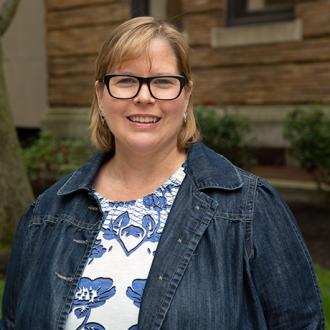The Tufts University School of Dental Medicine has received funding from the Health Resources and Services Administration (HRSA) for a predoctoral dental training program, which includes a partnership with Simmons School of Social Work (SSW). Over the next five years, Tufts dental students and on-the-ground Simmons MSW students will work together to address vulnerable and underserved populations with complex medical and mental health issues.

The past winter, Dr. Maria Dolce, a faculty member at Tufts School of Dental Medicine, reached out to SSW Professor & Director Dr. Melinda Gushwa with an idea. Dolce wanted Simmons to be a partner for a new project proposal, Integrated Care to Address Complexities of Oral Health for Vulnerable and Underserved Populations: Interprofessional Teamwork, Cultural Competence, Health Literacy, and Social Determinants of Health.
Dolce envisioned an opportunity for dental patients with complex needs to work with dental students, with the additional support of a social work student to advocate for them. For example, dental issues can become more complicated for families when a patient has a long history of substance misuse, and people with such issues may require dental work as the result of injuries that occur while intoxicated. Further, patients may lack access to resources and supports needed to fully participate in their treatment. "The idea is to create teams where dental and social work students work together on complex cases," says Gushwa. The program will focus on kids with developmental disabilities, including cognitive impairments; and adults with complex medical issues and behavioral health needs.
This is not the first collaboration between Tufts and Simmons. Over the last four years, Simmons SSW has been working with the Tufts Medical School as part of their interservice clerkship, which involves medical students and social work students working with actors to roleplay end of life cases.
This new partnership has received a five-year grant from the HRSA. The first year will be devoted to the development of curriculum and models. The second and third years will involve 16 MSW students each, and the fourth and fifth years will involve 23 MSW students each. For Gushwa, "the goal is to recruit students who match the racial and ethnic identities of the patients being served."
The partnership will also involve a virtual reality component, in which actors playing patients will offer simulations of cases, which students will work on together.
As Gushwa explains, "this is a rich environment for social workers." For example, if a dental student is dealing with a child with dental needs and cognitive needs, a social worker can provide critical resources to the family. Social workers can also help older, socially isolated adults who need dental treatment. "The social worker can ensure that the patient gets holistic care and that all the patient's needs are met. So this is a very exciting pairing," says Gushwa.

Dr. Cali-Ryan Collin, as Assistant Professor at the SSW, has also been involved in preparing for the collaboration with Tufts. "This partnership increases the capacity to treat the whole person and think about health in an expanded way," she says. "Social workers have an opportunity to reach patients who might not have otherwise sought services and address the psychosocial factors that impact their overall health. It is an opportunity to improve patient care by recognizing that all kinds of health – oral, physical, mental – are connected."
One of the unique aspects of this partnership is the inter-professional educational opportunity it creates for Simmons students. "It transforms the clinic into an enhanced clinical training environment, which prepares everyone to collaborate inter-professionally," explains Gushwa.
Inspired by this partnership, Simmons is developing a course in inter-professional education for the MSW program. "This seminar will be the only one of its kind in Boston," says Gushwa. Students partaking in the simulations will also be in the course, which will help them cultivate inter-professional competencies.
"We understand the value of working in teams, and this helps us develop holistic treatment plans that best serve patients," says Gushwa.
Dr. Collin also realizes the value of this pedagogic model, as she is the SSW's SWIPE ( social work inter-professional education) Coordinator. In her view, "IPE provides the opportunity for students to learn with, from, and about one another. It enhances the way we practice as a collective of specialist disciplines leading to improvements in patient care. It teaches us to continually center the patient within our practice while creating an opportunity for interdisciplinary support among different disciplines, reminding us that we are better together."
The new partnership with Tufts exemplifies the first-rate education offered at Simmons. As Gushwa remarks, "Tufts knows that Simmons educates the best clinical social workers in the region."

